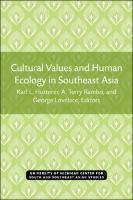Cultural Values and Human Ecology in Southeast Asia
| dc.contributor.editor | Hutterer, Karl L. | |
| dc.contributor.editor | Terry Rambo, A. | |
| dc.contributor.editor | Lovelace, George | |
| dc.date.accessioned | 2020-09-23T15:19:40Z | |
| dc.date.available | 2020-09-23T15:19:40Z | |
| dc.date.issued | 2020 | |
| dc.identifier | ONIX_20200923_9780472902293_51 | |
| dc.identifier | OCN: 1276901673 | |
| dc.identifier.uri | https://library.oapen.org/handle/20.500.12657/41855 | |
| dc.description.abstract | Ecologists have long based their conceptual frameworks in the natural sciences. Recently, however, they have acknowledged that ecosystems cannot be understood without taking into account human interventions that may have taken place for thousands of years. And for their part, social scientists have recognized that human behavior must be understood in the environment in which it is acted out. Researchers have thus begun to develop the area of "human ecology." Yet human ecology needs suitable conceptual frameworks to tie the human and natural together. In response, Cultural Values and Human Ecology uses the framework of cultural values to collect a set of highly diverse contributions to the field of human ecology. Values represent an important and essential aspect of the intellectual organization of a society, integrated into and ordained by the over-arching cosmological system, and constituting the meaningful basis for action, in terms of concreteness and abstraction of content as well as mutability and permanence. Because of this balance, values lend themselves to the kinds of analyses of ecological relationships conducted here, those that demand a reasonable amount of specificity as well as historical stability. The contributions to Cultural Values and Human Ecology are exceedingly diverse. They include abstract theoretical discussions and specific case studies, ranging across the landscape of Southeast Asia from the islands to southern China. They deal with hunting-gathering populations as well as peasants operating within contemporary nation-states, and they are the work of natural scientists, social scientists, and humanists of Western and Asian origin. Diversity in the backgrounds of the authors contributes most to the varied approaches to the theme of this volume, because differences in cultural background and academic tradition will lead to different research interests and to differences in the empirical approaches chosen to pursue given problems. | |
| dc.language | English | |
| dc.relation.ispartofseries | Michigan Papers On South And Southeast Asia | |
| dc.subject.classification | thema EDItEUR::J Society and Social Sciences::JH Sociology and anthropology | en_US |
| dc.subject.other | Sociology and anthropology | |
| dc.title | Cultural Values and Human Ecology in Southeast Asia | |
| dc.type | book | |
| oapen.identifier.doi | 10.3998/mpub.19463 | |
| oapen.relation.isPublishedBy | e07ce9b5-7a46-4096-8f0c-bc1920e3d889 | |
| oapen.relation.isFundedBy | 0314e571-4102-4526-b014-3ed8f2d6750a | |
| oapen.relation.isFundedBy | 0cdc3d7c-5c59-49ed-9dba-ad641acd8fd1 | |
| oapen.imprint | U OF M CENTER FOR SOUTH EAST ASIAN STUDI | |
| oapen.series.number | 27 | |
| oapen.pages | 428 | |
| oapen.place.publication | Ann Arbor | |
| oapen.grant.number | [grantnumber unknown] | |
| oapen.grant.number | [grantnumber unknown] | |
| peerreview.anonymity | Double-anonymised | |
| peerreview.id | d98bf225-990a-4ac4-acf4-fd7bf0dfb00c | |
| peerreview.open.review | No | |
| peerreview.publish.responsibility | Scientific or Editorial Board | |
| peerreview.review.decision | Yes | |
| peerreview.review.stage | Pre-publication | |
| peerreview.review.type | Full text | |
| peerreview.reviewer.type | External peer reviewer | |
| oapen.review.comments | The proposal was selected by the acquisitions editor who invited a full manuscript. The full manuscript was reviewed by two external readers using a double-blind process. Based on the acquisitions editor recommendation, the external reviews, and their own analysis, the Executive Committee (Editorial Board) of U-M Press approved the project for publication. |

